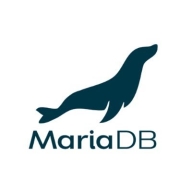

MariaDB and Oracle Java DB cater to different database needs, with MariaDB having the advantage due to its broader features and scalability.
Features: MariaDB offers high performance, multiple storage engines, and supports a variety of programming languages, making it suitable for enterprise use. It also includes clustering and replication features. Oracle Java DB is known for its small footprint and seamless integration with Java applications, making it ideal for developers seeking an embedded database solution.
Room for Improvement: MariaDB could improve in terms of cloud-native features and enhanced GUI tools. It might also benefit from simplifying complex configurations and expanding third-party integration. Oracle Java DB would gain from enhanced scalability options, better performance on large datasets, and more robust community support and resources.
Ease of Deployment and Customer Service: MariaDB offers flexible deployment for various environments and comprehensive documentation along with an active community for support. Oracle Java DB has a straightforward deployment process for Java developers, though its support options are not as comprehensive as MariaDB's.
Pricing and ROI: MariaDB is a cost-effective solution with no licensing fees, favorable for enterprises with large-scale data needs due to its high return on investment. Oracle Java DB, with potentially lower initial costs due to its small scale, might impact long-term ROI due to its limited scalability.
| Product | Market Share (%) |
|---|---|
| MariaDB | 5.7% |
| Oracle Java DB | 1.0% |
| Other | 93.3% |


| Company Size | Count |
|---|---|
| Small Business | 27 |
| Midsize Enterprise | 12 |
| Large Enterprise | 25 |
| Company Size | Count |
|---|---|
| Small Business | 4 |
| Midsize Enterprise | 2 |
| Large Enterprise | 6 |
MariaDB is an open source relational database created by the original founders of MySQL. It is considered one of the most popular and trusted database servers throughout the world. MariaDB is a valued component found in most cloud offerings and is the default in many Linux tools. It is also widely used by Wikipedia, WordPress, and Google, among other well-known sites. Maria DB easily melds data into concise information from a vast array of applications, such as banking, online shopping, websites, and more.
MariaDB was originally created to improve MySQL performance. It is the most widely chosen database server due to the solution being super fast, robust, user-friendly, and easily scalable. MariaDB also offers a substantial ecosystem of plugins, storage engines, and numerous other valuable tools that make it very attractive for a significant offering of use cases.
The solution’s newest functionalities include compatibility with Oracle Database and Temporal Data Tables, and advanced clustering with Galera Cluster 4, which make it easier for users to research data history from any point in the past. Additionally, the most recent versions include JSON and GIS features. MariaDB is committed to staying an open source solution.
MariaDB Features
Reviews from Real Users
Faustine C., Engineering Supervisor- Corporate Data Solutions and Services at TZ Telecoms Corporation, shares, “The software provides a lot of information on what is happening inside the database. For most performance parameters it is easy to know if something is not right in the configuration or optimization which helps engineers take remedial fine-tuning measures. For example, if the database is underperforming it is easy to know which performance parameter can be adjusted to handle the workload. It is difficult to troubleshoot database issues if many performance parameters can not be monitored or debugged which is the case with some database management systems. It provides great monitoring of data storage, processing, and performance stability which is really important for real-time data storage and processing. It's a user-friendly product.”
A PeerSpot user who is a Senior Engineer at a tech services company relates, “ The solution's high availability is its most valuable aspect. We have found the product to be stable and the initial setup is pretty simple. I'd rate the solution at a ten out of ten. I'm very happy with it overall. I would recommend the solution to others. It's easy to find details about the product online and to learn about it.”
Java DB is a relational database management system (RDBMS). Data is stored and queried via SQL or JDBC. Like other RDBMSs, Java DB can also be accessed through a persistence layer such as JPA, Hibernate, or JDO. Java objects can be stored in the columns of Java DB tables.
We monitor all Relational Databases Tools reviews to prevent fraudulent reviews and keep review quality high. We do not post reviews by company employees or direct competitors. We validate each review for authenticity via cross-reference with LinkedIn, and personal follow-up with the reviewer when necessary.